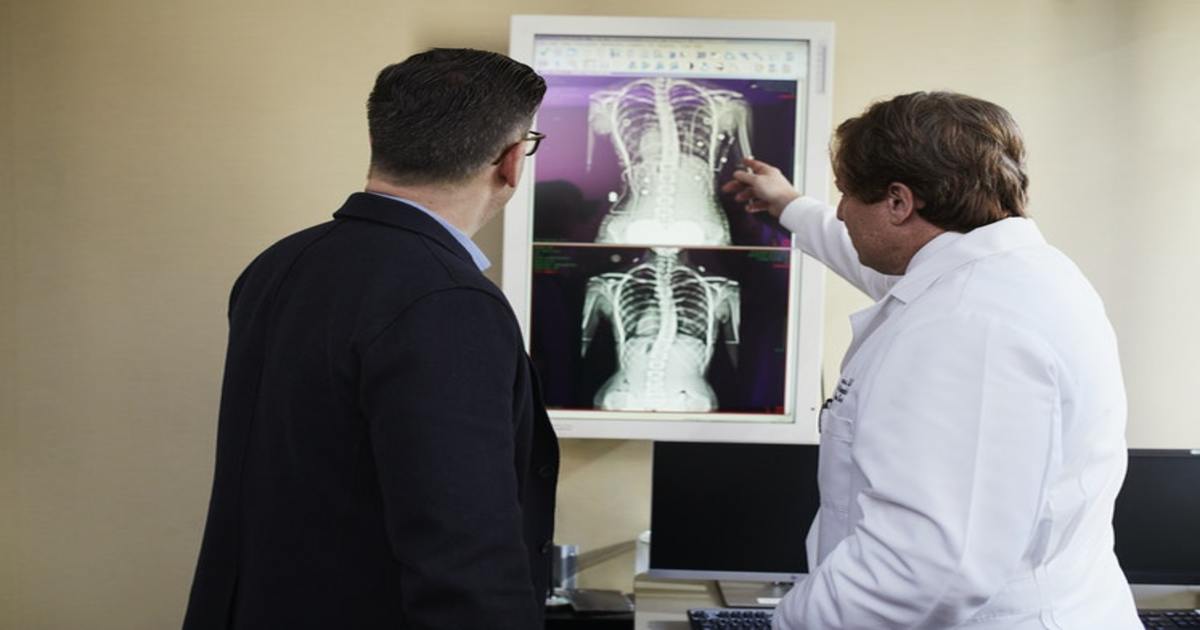
Health Technology, Digital Healthcare
Article | July 14, 2023
With consumers’ share of healthcare costs expanding, we need to do a better job making charges more transparent and more predictable
My husband recently stubbed his toe. Badly. Badly enough that I encouraged him to go see a doctor. He was reluctant. While I suspected he’d rather just garner sympathy by complaining to me while limping around the house (just kidding, honey), his stated reason was all too familiar: “I have no idea what we’ll have to pay. They’ll want to do anX-ray,it might need surgery, and I have no idea what it’ll cost.” All true. We have good health insurance; but like most Americans, when we go to the doctor or have a procedure, what we will actuallyhave topay out of pocket remains a mystery.This is something that we can and should change.
As consumers we are shouldering more and more of the cost of healthcare. And the biggest increases are for those of us with employer-sponsored plans. According to an analysis of federal data by the Commonwealth Fund,deductibles in employer plans more than doubled between 2008 and 2017, from $869 to $1,808. Especially troubling, an accompanyingCommonwealth Fund survey revealed that only 62% of adults were very or somewhat confident in their ability to afford healthcare.
This increasing burden is also evident when you look at the crushing levels of medical debt in the United States. According to a new studyby JAMA, medical debt is now the largest contributor to personal debt. And the data for this study was collectedbeforethe COVID-19 pandemic.
Some of this debt is driven by unpredictability—if the heart procedure you needed costs several thousand dollars more out of pocketthan you thought it would, you may not be prepared, emotionally or financially, to pay it. This is a bad outcome, obviously. The risk of nonpayment rises for the provider; and a recuperating patient is burdened with the stress of a large,unexpected bill.
More skin in the game
Soas consumers are paying more out of pocket, some may become reluctant to seek care (like my husband) or seek more information about what they willhaveto pay for the care they receive. Consumers are also armed with incredible levels of price transparency with other products—everything from hotel rooms to clothing to household items. With so much skin in the game, and the internet providing so much information, consumers’ expectations are changing when it comes to healthcare.
State and federal regulators are also beginning to take action, a trend that will likely accelerate. Most hospitals are now required to publicly disclose the prices they charge. This does not, however, solve the issue for consumers. While it provides a measure of visibility into pricing for insurance companies, Medicare, and Medicaid, it doesn’t show what share the patient will ultimately pay.
Making the complicated simple
The complexity of pricing in healthcare is well documented. Niall Brennan, CEO of the Health Care Cost Institute, a nonprofit that analyzes medical costs, suggests that healthcare costs are too high.As a recent Wall Street Journal article reported, a price of a C-section varied from $6,241 to$60,584 at one hospital. This all has to do with the vagaries of the agreements that hospitals sign with multiple insurance companies and government payers. In turn, each insurance company will have its own deductible and out-of-pocket schedules, which providers don’t have access to.
We are seeking to change this at Change Healthcare. We are piloting our Care Cost Estimator with a few innovative providers. With the Care Cost Estimator, weleverage our unique dataset, and the largest eligibility network in the industry, to make the unpredictable, predictable.Because we’ve managed 15 billion healthcare transactions—and our network covers 1 million physicians, 6,000 hospitals, and 2,400 payers—we have an unmatched ability to analyze what real-world patients are paying for practically any procedure, performed at almost any hospital or clinic.
With a cloud-based transaction engine, providers will now be able to tell their patients how much they will have to pay out of pocket for a given procedure.And this analysis takes place in real time.
Removing unpredictability in pricing
This gives providers the opportunity to offer added value for their patients, taking some unpredictability out of whatis often a stressful transaction. In addition, it accelerates patient payment cycles which, as the patient’s share of the cost burden increases, is becoming more and more important. We’re not talking $50 co-pays anymore; it’s thousands of dollars per transaction. If necessary, providers can also help the patient plan for the expense, offering financing options, thus reducing unpaid bills. For the patient, it allows more informed decision-making and peace of mind.
Testing the beta version of our Care Cost Estimator with our partners will allow us to receive real-world feedback and collaborate with customers on how to continuously improve the product as we scale it. We expect the ROI for providers, in addition to the payment-cycle improvements, will include greater patient satisfaction and loyalty. For the patient, it provides information necessary to help make proper decisions and plan emotionally and financially; in other words, giving the consumer the same information for vital healthcare transactions that’s available to them for practically any other purchase.
This kind of win-win solution is at the core of Change Healthcare’s mission to improve the healthcare experience for everyone—including my husband and his broken toe!
Read More

Digital Healthcare
Article | November 29, 2023
The healthcare industry is experiencing rapid shifts. Some of this is due to the current pandemic, but much of this evolution was happening even before the COVID-19 outbreak. Understanding and embracing the introduction of new technology into the market will be important for healthcare professionals and patients alike. Here are some of the trends worth keeping tabs on:
Read More

Health Technology, Digital Healthcare
Article | August 21, 2023
Virtual reality (VR), the new technological advancement, is set to transform practices in the healthcare industry. According to Statista, it is estimated that, by 2022, the second largest market share of VR will be from the healthcare industry. Virtual reality in healthcare operates in various divisions to offer a greater quality of patient care and performance of medical professionals. For the health and healthcare industry, from the clinical process to the user, VR has a multitude of applications such as tutoring future doctors, generating new life-saving routines, etc.
Virtual reality in healthcare can confront the challenges in the industry, including efficiently handling huge healthcare databases, training and development of medical professionals, patient engagement, disease awareness, medical marketing, patient treatment, etc. Virtual reality in the healthcare market, according to a report from Reports and Data, is expected to reach USD 8.03 billion by 2027 from USD 2.06 billion in 2019.
This article discusses how virtual reality in healthcare is going to transform the industry by applying it in various divisions such as medical training, patient treatment, patient engagement, disease awareness, and medical marketing.
Virtual Reality in Healthcare Training
VR in healthcare can transport you to areas, inside of the human body, that otherwise would be impossible to access and view. Medical students currently use cadavers to learn, but cadavers do not react the same way live patients do. Also, cadavers are very difficult to get hold of. When VR is used in healthcare training, students can view even minute detail of all parts of the body. This view is possible in stunning 360° CGI reconstruction and creates training scenarios, which would replicate real surgical procedures.
Virtual Reality in healthcare can be used to deliver high-quality surgical training. Using virtual reality, 4K 360° video of real-life surgery is filmed from multiple angles. Then it is combined with CGI models of the anatomy, which is being operated. This advanced use of virtual reality in healthcare provides medical students with an interactive and immersive training experience.
Treatment
Patient Education
The ability of virtual reality in healthcare to see inside of the human body is useful for both doctors and patients. With the help of VR, doctors can take patients through their surgical plan. This is made possible by a virtual view of the anatomy and pathology of patients through a patient-specific 360° VR reconstruction. The result of this is an enhanced understanding of the treatment for patients and higher patient satisfaction.
Robotic Surgery
Robotic surgery is a recent innovation. A robotic device, such as a robotic arm, is used in a robotic surgery while being controlled by a human surgeon. This utilization of virtual reality in healthcare makes sure of fewer or no risk of complications in surgeries. This also makes the surgeon finish the surgery procedure faster with greater accuracy. The robotic devices are accurate with reduced blood loss, smaller incisions, and faster recovery.
Mental Health and Psychological Therapy
The unique ability of virtual reality technology to take you anywhere virtually can be utilized to create a powerful virtual reality simulation in healthcare of various scenarios in which psychological issues occur. This eliminates the necessity of a therapist accompanying patients to various scenarios such as a tall building or a crowded shopping center to provide proper counseling. These scenarios can be easily created with virtual reality technology in healthcare. Virtual reality in healthcare market has also been used to help autistic children in the classroom, curb memory loss, and gather data for dementia research.
Pain Management and Physical Therapy
Apart from psychological issues, the healing capabilities of VR are also used in pain management and physical treatment. According to a study by the UW Harborview Burn Centre and the University of Washington Seattle, a full VR immersion acted as a distraction for patients, who were undergoing physical therapy after a skin graft. This distraction subsequently reduced their feeling of pain.
Virtual reality in healthcare is also found to be effective in reducing recovery time in physical therapy. Patients performing their daily exercises in a virtual environment, find the task to be more fun than usual. It also keeps the patients focused and helps them keep their spirits up and recover sooner.
Patient Engagement
With the help of virtual reality in healthcare, patients can experience a virtual tour of the inside of their bodies before surgeries. This is a 360-degree, three-dimensional (3D) tour. This enables patients to know their body, anatomy, and pathology, before the surgical procedures. Virtual Reality Medical Visualization platform is developed for the tour.
These advancements with virtual reality in healthcare engage patients thoroughly, which reduces tension and lead to a speedy recovery.
Medical Marketing
The most popular and initial application of Virtual reality was marketing. Still, it continues to be one of the most effective and powerful marketing tools. The ability to use VR to project the future of healthcare is the most powerful tactic in healthcare marketing. With Virtual reality in healthcare, one of the most powerful tactics that you can have to market in the industry is to show people what changes they can expect when they start or stop exercising, lose or gain weight, the progress they make through cancer treatments, etc.
As the possibilities of virtual reality in healthcare are endless, healthcare professionals and providers can attract more patients, doctors with high caliber, and nursing staff to your facilities. When those are in short supply, virtual reality in healthcare can be used as an excellent healthcare marketing tool to ensure expected results.
Disease Awareness
AbbVie, a pharmaceutical research & development company, created an experience to educate medical professionals and raise awareness among them regarding the daily struggle Parkinson’s disease patients undergo. The experience was demonstrated at a pharmaceutical industry trade show. People put on a headset and experienced how Parkinson’s sufferers navigate a virtual supermarket, meeting with difficult moments when they come in contact with other people.
Such experiences with virtual reality in healthcare help raise awareness for various diseases among professionals and patients. Virtual reality presentations can be conducted to raise awareness of certain diseases.
The Future of Virtual Reality in Healthcare
A lot of applications of virtual reality in healthcare are in their nascent stage. In the coming years, virtual reality will be used more in healthcare, which will improve the effectiveness and accuracy of present procedures. It will also enhance the various human capabilities, for both patients and medical professionals. Virtual reality in healthcare has huge potential, but only limited by the ingenuity and creativity of people who create and apply the technology. VR will surely transform medical training, physical and psychological therapies, rehabilitation, mental health treatments, and patient engagement, among others.
Virtual reality in healthcare holds the power to transform the way doctors are trained and treatment is provided to patients. According to reports from various market research companies, especially research done by Grand View Research, predict that, by 2025, virtual reality in the healthcare market will grow to a whopping US$5.1 billion. The major driving forces behind this growth are Rapid technological advancements in the healthcare industry and driving demand for rehabilitation and simulation training.
Frequently asked questions
How is virtual reality used in healthcare?
In healthcare, virtual reality is used in treatment, training, and to raise awareness among medical professionals and patients regarding various diseases. Patients and doctors are made to view the inside of the human body using virtual reality.
Where is virtual reality used in healthcare?
Virtual reality is used in various sectors of healthcare to deliver high quality patient care. Treatment with the assistance of virtual reality also increases the efficiency of medical professionals. Virtual treating is applied in all aspects of medical treatment.
What are the benefits of virtual reality?
Virtual reality in healthcare saves both, the time and money of healthcare providers. It also makes the work of medical professionals more convenient. It eliminates unnecessary travel for treatments by making appropriate decisions.
How virtual reality is changing healthcare?
Virtual reality is changing the healthcare by providing different advanced ways of treatments, especially for physical and psychological therapy, surgeries, pain management, and stress management and by assisting the rehabilitation process effectively.
Read More

Future of Healthcare
Article | July 6, 2023
Unleash the power of attending EHR events, empowering healthcare providers with accessible patient information for enhanced care. Stay updated with the latest trends at these top EHR summits.
Electronic health records (EHRs) have sparked a transformative revolution in the healthcare industry, empowering providers with readily accessible patient information. With technology progressing and digital healthcare solutions becoming increasingly vital, staying up-to-date with the latest EHR trends and developments has become crucial for healthcare professionals and C-suite executives.
This article highlights a curated list of EHR events that gather visionaries, experts, and pioneers from diverse domains to foster knowledge exchange, collaborations, and exploration of cutting-edge EHR advancements propelling the industry to new frontiers.
1. The MedTech Conference
October 9-11, 2023 | California
This EHR conference offers attendees an opportunity to stay abreast of the latest updates and insights through an extensive program featuring over 100 sessions that showcase diverse perspectives. From examining physicians' viewpoints on value-based care to exploring the approaches of policymakers in cybersecurity and trade considerations, as well as delving into the innovative applications of AI by scientists, the conference provides a platform for knowledge exchange. With world-class speakers, comprehensive educational programming, valuable networking opportunities, and the potential for business development, this EHR summit serves as a homecoming for the global medtech community, fostering collaboration and forming partnerships that drive innovative solutions for a healthier world.
2. IEEE International Conference on Digital Health
July 2-8, 2023 | Chicago
The IEEE International Conference on Digital Health (ICDH) stands as a powerful global platform where esteemed researchers and industry practitioners converge to exchange cutting-edge advancements in digital health technologies. With a focus on both the current state-of-the-art and practical applications, ICDH facilitates discourse on emerging research themes and the future trajectory of digital health. Its overarching objective is to unite prominent researchers, community leaders, visionaries from academia and industry, end-users, and healthcare professionals in the digital health domain. It fosters the exchange of research findings, practical expertise, and forward-looking perspectives on sustainable health and social care transformations.
3. EAI MobiHealth 2023
November 28-30, 2023 | Portugal
The 12th EAI International Conference on Wireless Mobile Communication and Healthcare (MobiHealth 2023) serves as a testament to the significant growth of the healthcare industry, propelled by factors such as an aging population, the prevalence of chronic diseases, and technological advancements. The healthcare sector has been greatly influenced by wireless communication & mobile computing and is constantly evolving with new technologies like 5G, IoT, robotics, and smart buildings. The integration of these innovations, along with e-health, m-health, edge computing, software-defined networks, and network function virtualization, has further revolutionized the industry. This hybrid conference aims to unite individuals and organizations worldwide in wireless communication, mobile computing, and healthcare applications.
4. 3rd IEEE International Conference on ICT Solutions for eHealth
July 9-12, 2023 | Tunisia
e-Health has emerged as a significant research area, attracting cross-disciplinary research groups interested in deploying new ICT technologies for healthcare, particularly cloud computing, IoT, and computational intelligence. After five successful workshop editions, ICTS4eHealth, which has transitioned into an International IEEE Conference, now announced its third edition. The conference brings together researchers from academia, industry, government, and medical centers to present the latest advancements in cloud systems for connected health infrastructure and applications and the utilization of IoT and computational intelligence techniques in eHealth. By fostering collaboration and knowledge exchange, this EHR conference aims to advance the field of e-Health and contribute to developing innovative ICT solutions for improved healthcare outcomes.
5. DigiHT 2023
October 19-20, 2023 | Virtual
The International Conference on Digital Health and Telemedicine 2023 (DigiHT 2023) will serve as a global platform for diverse participants, including academics, practitioners, technologists, application developers, students, and industry professionals. The conference will feature parallel sessions, enabling attendees to engage in knowledge-sharing and networking opportunities. It will also offer avenues for publishing research findings and host high-level forums featuring speeches from esteemed hospitals and health systems, both national and international, who will provide valuable perspectives, insights, and expertise. The central focus of the conference revolves around the theme 'Enhancing Health Equity and Improving Patient Outcomes: Empowerment Strategies for Patients to Take Control of Their Care and Well-being through Digital Healthcare.' EHR events like this one aim to increase access to health technology research and innovations while fostering collaboration and innovation among global digital health and telemedicine professionals.
6. MEDITECH LIVE 2023
September 20-22, 2023 | Massachusetts
This EHR conference aims to convene a diverse group of experienced healthcare innovators who are deeply committed to fostering collaboration amidst the ongoing transformation of health information technology. Through engaging in high-level panel discussions and specialized breakout sessions, participants will collectively explore the disruptive forces that impact the industry and brainstorm tangible solutions. EHR events like this serve as a platform for redefining the intersection of healthcare leadership and technology, focusing on making a meaningful impact on communities. Distinguished speakers at the event include Paul Keckley (Healthcare Policy Analyst and Managing Partner of Keckley Group) and Amer Kaissi, a nationally-recognized speaker, author & executive coach who will bring valuable insights to the discourse.
7. Electronic Medical Records Boot Camp
August 21-22, 2023 | Virtual
'Electronic Medical Records Boot Camp: Biostatistical Methods for Analyzing EMR Data' is a comprehensive two-day virtual event that offers seminars and interactive analytical sessions, providing participants with an in-depth understanding of electronic health data opportunities, statistical challenges, and the latest techniques. The widespread implementation of EHRs and EMRs in US hospitals has resulted in vast amounts of patient information, enabling cohort-wide investigations and personalized medicine. However, analyzing such extensive and diverse observational data poses technical difficulties. This intensive workshop addresses the potential of EMR/EHR data for health studies, statistical challenges, and advanced techniques through hands-on computer lab sessions and case studies. Participants will learn about data integration, addressing biases and missing data, comparative effectiveness studies, and predictive analysis. By the end of the boot camp, attendees will be well-versed in harnessing the power of EMR/EHR data for transformative healthcare research.
8. eClinicalWorks National Conference
October 20-22, 2023 | Tennessee
Gaylord Opryland Resort & Convention Center in Nashville will host electronic health records events like eClinical Works National Conference. This EHR summit will be an engaging and informative event for healthcare professionals. Attendees can delve into the latest enhancements and developments related to the V12 and Healow products for three days. The event will showcase these products' cutting-edge features and functionalities, demonstrating their potential to revolutionize the healthcare industry.
9. 2023 GSA Conference Workshop
November 8-12, 2023 | Florida
At the Gerontological Society of America (GSA) 2023 Annual Scientific Meeting in November, multiple principal investigator Vincent Mor, Ph.D., and colleagues will conduct a workshop titled 'The Long-Term Care Data Cooperative: Leveraging Nursing Home Electronic Health Records for Research.' Funded by National Institute of Aging, this initiative aims to enhance care quality in skilled nursing facilities by compiling comprehensive electronic health records data from over 2,100 nursing homes nationwide. The workshop will allow attendees to explore sample data, understand the core data model, and learn how to request access for research purposes. Additionally, interested participants can apply for 'real-world data scholars' training grants to leverage this valuable resource further.
10. International Conference on Global Healthcare
November 16-18, 2023 | France
The 10th edition of the upcoming scientific conference (Global Healthcare 2023) will be held in Paris. With a central theme of 'Fostering the Endeavors to Enhance Global Healthcare, ' this EHR summit aims to be the largest and most comprehensive event in the worldwide healthcare industry. The conference will focus on various aspects such as clinical best practices, research advancements, innovation, discoveries, and emerging trends in healthcare. Attendees can expect an enriching scientific program featuring symposiums, seminars, keynote addresses, oral presentations, and poster presentations showcasing the latest global best practices, research findings, industry regulations, and technological breakthroughs. EHR events like this one are held to empower attendees by providing comprehensive insights and fostering knowledge exchange in electronic health records and beyond.
Final Analysis
These electronic health records events offer medical professionals a comprehensive conference track that is tailored to their specific needs and interests. Attendees can engage in face-to-face conversations, access high-quality programming focused on current hot topics, and benefit from unparalleled networking with industry leaders, making these EHR events a must-attend! Furthermore, the conference track provides medical professionals with specialized sessions, workshops, and presentations that delve deep into the practical aspects of implementing, optimizing, and utilizing electronic health record systems. By actively participating in these sessions, medical professionals can gain practical skills, learn best practices, and acquire valuable insights that can directly impact their daily routine and patient care.
Read More